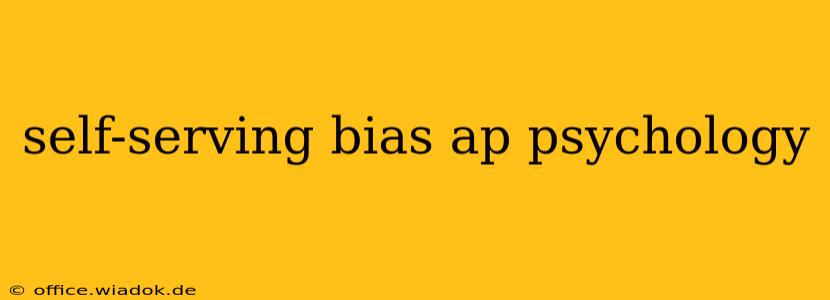Self-serving bias is a common cognitive bias where individuals attribute positive events to internal factors (their own abilities or efforts) while attributing negative events to external factors (bad luck, other people's actions, or circumstances). It's a fascinating aspect of social psychology that significantly impacts how we perceive ourselves and the world around us. This deep dive into self-serving bias will explore its mechanisms, manifestations, and implications.
What is Self-Serving Bias? A Closer Look
At its core, self-serving bias is a protective mechanism. We naturally want to maintain a positive self-image. Attributing successes to our own merit boosts our self-esteem, while blaming external factors for failures protects us from feelings of inadequacy or incompetence. This isn't necessarily a conscious process; it often operates implicitly, shaping our interpretations and judgments without us fully realizing it.
Examples of Self-Serving Bias in Action
Consider these scenarios:
- Academic Performance: A student who gets a good grade on an exam attributes it to their hard work and intelligence. However, if they fail, they might blame the teacher's unfair test or a distracting classroom environment.
- Sports Games: A winning athlete credits their victory to skill and training. A losing athlete might blame poor officiating, bad luck, or the opposing team's superior performance.
- Workplace Successes and Failures: A successful businessperson might attribute their achievements to their strategic thinking and leadership. However, if a project fails, they might blame market conditions, unreliable partners, or unforeseen circumstances.
These examples illustrate how self-serving bias manifests in various aspects of life, subtly influencing our narratives and explanations of events.
The Mechanisms Behind Self-Serving Bias
Several psychological factors contribute to the emergence of self-serving bias:
- Motivation to Maintain Self-Esteem: A fundamental human need is to feel good about ourselves. Self-serving bias helps fulfill this need by preserving a positive self-image.
- Cognitive Processes: Our brains tend to process information in a way that confirms pre-existing beliefs, including beliefs about our abilities and competence. This confirmation bias reinforces self-serving attributions.
- Social Comparison: We constantly compare ourselves to others. Self-serving bias allows us to maintain a favorable comparison by highlighting our strengths and downplaying our weaknesses.
The Impact of Self-Serving Bias
While seemingly innocuous, self-serving bias can have significant consequences:
- Impeded Learning and Growth: If we always attribute failures to external factors, we miss opportunities for self-reflection and improvement. We fail to identify areas where we need to develop new skills or strategies.
- Strained Relationships: Constantly blaming others for problems can damage relationships, making it difficult to build trust and cooperation.
- Inflated Self-Perception: An overreliance on self-serving bias can lead to an unrealistic and inflated view of our abilities and accomplishments. This can lead to poor decision-making and unrealistic expectations.
Counteracting Self-Serving Bias
While self-serving bias is a natural human tendency, it's important to develop strategies to mitigate its negative effects:
- Self-Awareness: Recognizing that you might be prone to self-serving bias is the first step towards addressing it. Pay attention to your thought patterns and try to identify instances where you might be making self-serving attributions.
- Seeking Feedback: Actively solicit feedback from trusted sources. Constructive criticism, even if difficult to hear, can help you gain a more balanced perspective on your strengths and weaknesses.
- Focusing on Effort and Process: Shift your attention from outcomes to the effort you put in. This helps to decouple your self-worth from the results you achieve.
- Objective Self-Assessment: Regularly engage in objective self-assessment exercises to identify areas for improvement without resorting to self-serving rationalizations.
Conclusion: Navigating the Nuances of Self-Serving Bias
Self-serving bias, while a natural human tendency, is a complex cognitive bias with profound implications for our self-perception, relationships, and personal growth. Understanding its mechanisms and impact allows us to develop strategies for mitigating its negative consequences and cultivating a more realistic and balanced self-awareness. By consciously working to counteract this bias, we can foster greater personal growth and build more meaningful connections with others.

